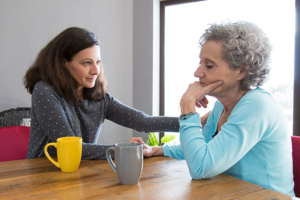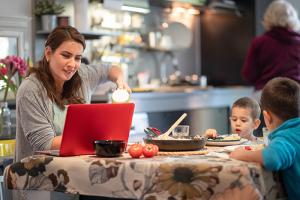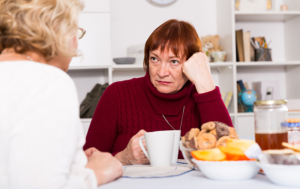Tips for Increasing Caregiving Patience: It Takes Practice!

Taking care of an aging adult can be tiresome, but these tips can help you with increasing caregiving patience.
Does waiting in line at the grocery store make you want to pull your hair out? Do you get antsy when the doctor is running behind for your appointment? Some people just appear to project a natural sense of patience, no matter what the circumstances. Wouldn’t you like to know their secret, particularly when it comes increasing caregiver patience in caring for a loved one?
Thankfully, it is possible to increase your level of patience in much the same manner in which you increase your endurance in exercising – through practice. Try these recommendations to help with increasing caregiver patience:
How Do I Become More Patient?
- It’s OK to not fix the problem immediately. Allow something that is broken to remain broken for some time as opposed to pressuring yourself to quickly deal with it.
- Take a beat, and truly listen when others are speaking. It’s easy to begin formulating your response before the person has finished, but strive to place all your concentration instead on everything they are saying.
- Attempt to channel your inner child. Let yourself laugh more, be silly, and remind yourself not to permit the small things that irritate you to become big things. A little lightening up and letting go can go a considerable way towards getting rid of stress.
- Focus on being in the moment. When your thoughts begin to wander, recognize the distraction, but gently guide your thinking back to your breathing.
- Deliberately put yourself in circumstances that necessitate patience. Let someone go ahead of you next time you’re standing in line. Make yourself wait a few moments (or more!) prior to checking your phone. Initiate a conversation with an individual who tests your patience.
- Accept your present circumstances. Perhaps the person you’re caring for is taking a lot longer to get dressed than you’d like. Remind yourself that your job is to provide care but to also allow the person to stay as independent as possible, and often that will call for allowing some additional time and a good measure of patience.
When time is of the essence, however, it becomes all the harder to stay patient. Let a caregiver from Responsive Home Care help. We are available to provide a full range of home care in Lighthouse Point and the nearby areas that will help you free up the time you need. Reach out to us at (954) 486-6440 to find out more information and to ask about a free in-home consultation.


 If you were to list the top five emotions you experience in meeting the caregiving needs of your elderly parents, what would they be? Maybe you’d first think of emotions like love, compassion, and in some cases, even frustration or stress. Would
If you were to list the top five emotions you experience in meeting the caregiving needs of your elderly parents, what would they be? Maybe you’d first think of emotions like love, compassion, and in some cases, even frustration or stress. Would 




 There’s no question that it’s a great honor to care for family we love. Family caregivers experience a closeness and connection with those in their care that generally far outweigh the difficulties. Yet unfortunately there are also difficulties. A continuous to-do list to make certain the person you’re providing care for is as healthy and happy as possible. Household duties and errands to manage. Career responsibilities. The requirements of other relatives and friends. And don’t leave out self-care.
There’s no question that it’s a great honor to care for family we love. Family caregivers experience a closeness and connection with those in their care that generally far outweigh the difficulties. Yet unfortunately there are also difficulties. A continuous to-do list to make certain the person you’re providing care for is as healthy and happy as possible. Household duties and errands to manage. Career responsibilities. The requirements of other relatives and friends. And don’t leave out self-care.

